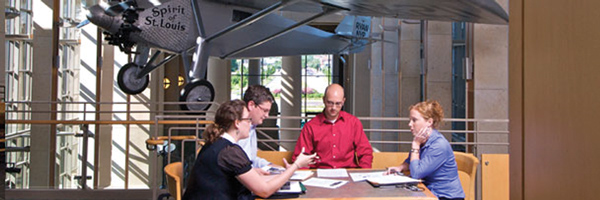mez | News
Four Olin Business School students involved in University alcohol policy
 Courtesy Of WUSTL Photo Services
Courtesy Of WUSTL Photo Services Olin Business School students consulting teams help participating nonprofit organizations perform more effectively at the Olin Tayler History Museum.
Sometimes learning in the classroom is not enough. The Center for Experiential Learning (CEL) in Olin Business School offers upper-level undergraduate and graduate students the opportunity to participate in consulting projects in a real-time business context. By engaging in a project sponsored by a local organization, four to five students can apply their business skills and managerial insights to real business challenges posed by a client.
“The project creates a continuous interactive business environment for our students,” said Mark Soczek, Director of the Center for Experiential Learning. “They engage in frequent phone conversation and meetings with our clients. In some sense, it’s a quasi-internship.”
Among the ongoing projects of the CEL, the University Alcohol Policy Practicum brings attention to the community. Four current MBA students are working in conjunction with the University Council on Alcohol (UCA) to review the University’s alcohol policy. This is the first time the University has approached the issue of alcohol with the active involvement of students.
“The reason why the UCA wants to engage a student team is that students have first-hand familiarity on the issue,” Soczek said. “Their fresh perspective can accurately portray current situations and thus provide useful suggestions.”
During the first half of the semester, the team spent most of their time gathering background information and accessing how the UCA functions.
“We have researched a lot of academic literatures regarding how the society addresses the issue of high-risk drinking on campus,” said Jake Mervis, MBA 2011 student and the leader of the project team. “Statistics indicate that 1,400 students per year died from alcohol-related injuries [nationwide].”
To discuss potential sources of problems and corresponding solutions, the team also had conversations with representatives from other private universities that are facing similar alcohol issues.
Now the team has started to turn inward and evaluate specific factors at Wash. U. that contribute to the culture of high-risk drinking on campus.
“Research has shown that to solve the problem completely, we need to come up with a consistent strategy and develop a system that reinforces the strategy at [the] individual level, social level and environmental level,” Mervis said.
To that end, the team has interviewed key campus figures including heads of Residential Life, Greek Life, Student Health Services and the chief of police to get their assessment of the issue. Presumably, business owners in the community that sell alcohol would have a stake in implementing the strategy as well. Therefore, the team also plans to have conversations with sellers such as Schnucks and Anheuser-Busch. Later on, the team will create open discussion with student groups for more feedback.
Mervis further emphasized that effective interventions for the University alcohol policy should be based on informed research. Wash. U. needs a developed system to monitor and track data and collect feedback, according to Mervis. Coordination between administrators in the front line who make policy and students who follow is very crucial to an effective policy.
“The high-level goal is to create a five-year strategic plan for UCA and implement some evidence-based approaches that serve the larger community well,” Mervis said.
Given its comprehensive goal, the project might be turned into a multi-semester initiative. Furthermore, both Soczek and Mervis expect that the scope of the project could be expanded further in the future, involving more students and faculty members all across the campus.
From a business perspective, Mervis noted that participation in the project has been a great learning experience involving critical thinking, strategic planning and marketing.
“In terms of strategic planning, we did comparable analyses across different universities, digging into the causes of high-risk drinking among college students,” Mervis said. “We also conducted continuous conversations with key representatives in the community. I really appreciate the business experience as well as the opportunity of influencing the culture. It can be very helpful to my future work.”
